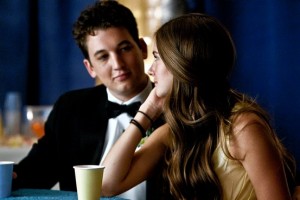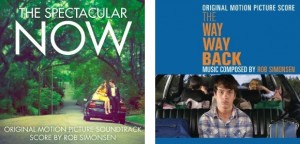Just as guitars and soulful rock-pop melody signaled the youthquake revolution in film scoring with Simon and Garfunkel’s score to THE GRADUATE in 1967, today’s movies about troubled teens on the cusp of a far larger adult world are sounding out with a similar spirit that reflects what the “kids” are listening to, as opposed to their grandparents’ old-school symphonic scores. However, pop-rock is an ever-growing animal as well, having ventured well off the top 40 mainstream since the days when a strumming approach was all that you needed to signal a post-adolescent breaking away from conformity. Now teen dramedies are all about an “alt.” approach that mixes in dreamy samples, a wide-range of acoustical instruments and eccentric percussion that captures the grunge / emo teen spirit.
So consider this style melodic ennui with a beat and a heart, a sound spectacularly employed for two of this summer’s best indie sleepers by an upcoming composer named Rob Simonsen. While not quite a spring chicken himself, Simonsen’s emotionally resonant, and often whimsical music for THE SPECTACULAR NOW and THE WAY WAY BACK recall the instrumental tastes employed by such of such song-minded filmmakers as John Hughes and Cameron Crowe for their seminal works FERRIS BUELLER’S DAY OFF and SAY ANYTHING. But here that vibe is given an even more subtly complex tone – something that can be equally said to these two pictures about class king and wallflower.
In James Ponsoldt’s THE SPECTACULAR NOW, Sutter Keely (Miles Teller) is the constantly “on,” with-it dude whose bravado masks a self-loathing guy on the graduation path to nowhere, even when given a chance for the first honest relationship in his life. For the spindly, put-upon Duncan (Liam James) in Nat Faxon and Jim Rash’s THE WAY WAY BACK, what looks to be the world’s worst summer in a seashore town turns into a shell-breaking experience for the barely verbal high schooler, courtesy of a water park’s wisecracking man-child Owen (Sam Rockwell). Simonsen’s subtly captivating music is totally in the headspace of these two characters, the hilarious boozy-brass opening of SPECTACULAR NOW gradually getting past the humor to reveal its drifting self in beautiful washes of melancholy melody. For THE WAY WAY BACK, an alternately lyrical and bouncy guitar-driven theme pushes Duncan out the door for his journey of water slide self-discovery, all while gentle, echoing chords and a piano show the dead-end his mom’s settled for with a passive-aggressive boyfriend.
Though each Simonsen score is character specific, they’re linked by an understated, highly melodic approach that links the films and their music as taking place in the same teen universe where quirky humor blends with the angst of invading adulthood. Their offbeat tones show that Simonsen has indeed learned well from time spent with Mychael Danna, a composer who set the bar for the musically offbeat with such scores as THE ICE STORM, THE SWEET HEREAFTER and LITTLE MISS SUNSHINE. Fully teaming as composers for the quirky acoustical romance of MANAGEMENT and a surprisingly traditional orchestral approach that counted down the bittersweet (500) DAYS OF SUMMER. While he’s remained just as busy with more grown-up concerns from a murderous heir in ALL GOOD THINGS to the cop family of TV’s BLUE BLOODS and the ironic task of SEEKING A FRIEND FOR THE END OF THE WORLD, THE SPECTACULAR NOW and THE WAY WAY BACK represent the full graduation of Simonsen into Gen Y scoring as he translates the tunes its characters listen to into the entrancing scores of their lives.
Assignment X: You began as an assistant, and then a co-writer with Mychael Danna, who was one of the pioneers of the Hollywood “alt. score” sound for intimate, often quirky dramas. How has your experience with him influenced your own composing voice?
ROB SIMONSEN: Mychael has taught me a lot about the intellectual side of film scoring. My process, pre-Danna tutelage, was “just sit and write what emotionally feels right”. But Mychael really plunges into how style, instrumentation and orchestration can speak to the intellectual sides of a film and it’s story. It took me a while to understand what he was doing, but in the end I gleaned a lot about that from him. Also, Mychael is so good at unexpected chord progressions and instruments. I think he influenced me in trying to take things in unexpected directions.
AX: You could say your “breakthrough” score was composing the studio-indie (500) DAYS OF SUMMER with Mychael. Could you tell us about this particular collaboration, and how it set the tone for alt. romance path you’re on now?
SIMONSEN: The collaboration was great. I always love working with Mychael because he’s a fantastic composer and a great friend and mentor. I learn so much from him, and always will. We worked on everything for (500) together and had a lot of fun on that score. As far as how it set the tone for the alt romance path I’m on now, well… I think when a composer is part of a film that strikes a nerve with audiences, that person often will get called to do something similar. The saying that “Hollywood doesn’t like hiring someone to do something they haven’t already done before” is true. Composers get typecast into a certain brand of score that they’ve done, because it was successful, and I can’t fault people for that tendency. It’s a financial and artistic attempt at creating success.
It’s difficult to finance (fiscally and energetically) a creative endeavor if there’s no model of past success (i.e. hiring a composer to score a film in a completely different genre than what they’ve done before). I think that’s a big part of why Hollywood is just churning up remakes and sequels. It’s grasping for any kind of franchise that were successful in the past. If there was money there before, the hope is that there will be money again. Hiring someone new? Starting up a new franchise? These are all risky things because you’re introducing something new to people, and they may not like it. “Risk” is an adverse word when talking to investors, and any filmmaker wants their film to be successful. So I think it’s only natural to go for someone that’s been a part of something that was successful before. Sometimes people get successes in different genres and continue to get diverse opportunities, but most of the time the thing that you’re most successful with will be the thing that people come asking you to do again. It’s the nature of the business. It’s human nature. I would do the same thing if I were a director, probably. I’m just grateful and flattered whenever my phone rings. I’ve been very fortunate to work on some really great films. The fact that many of them seem to be hovering in the same kind of genre is… Well, I think fruits of being part of something that struck a nerve. Thank you, creators of (500) DAYS OF SUMMER!
AX: Were you a fan of John Hughes and Cameron Crowe’s “ten” movies? And how do you think that kind of material has evolved for THE WAY WAY BACK and THE SPECTACULAR NOW?
SIMONSEN: Both of those guys are definitely great. I loved THE BREAKFAST CLUB when I was younger, and watched it over and over. SIXTEEN CANDLES, WEIRD SCIENCE, FERRIS BUELLER, VACATION... These were all major movies for me growing up (as I’m sure they were for most kids in the 80′s). I think we, as a culture, have a deeper understanding of our own situation and psychology. The problems of youth I don’t think have changed much, but the complexity and setting has. That’s especially true of THE SPECTACULAR NOW, which delves deeply into teenage alcoholism, father abandonment and self esteem issues. It goes quite a bit deeper than anything I saw in the 80′s. It’s a funny, heartwarming film, but it’s also heavy and dark. It’s bold, and I don’t think audiences would’ve embraced that film a couple decades ago. Perhaps not even five years ago. But today we have a much broader and more pervasive habit of self-examination, which I think is showing up in the complexities and psyches of the characters we watch in films. It’s a cool time to be alive.
AX: While Sutter Keely is a complete extrovert in THE SPECTACULAR NOW, Duncan in THE WAY WAY BACK barely talks at first. How do you think your scores for these teens compare, and contrast with each other?
SIMONSEN: Interesting question. For THE WAY WAY BACK Duncan really felt like he has a soul, but it’s hidden. He is shy and needs a little encouragement to spread his wings and grow into his own. We wanted Duncan to have a theme that would thread throughout the film and grow. Duncan’s theme in THE WAY WAY BACK, is full of quirky instruments, quirky and odd like he is. But they’re also tender and have heart, like he does. So we wanted the approach of the score to kind of pinpoint something internal- something that Duncan has, but maybe we’re not seeing on screen. The music maps out the hidden landscape that we will see blossom for him throughout the film.
With THE SPECTACULAR NOW, Sutter is such a broadly likable and outgoing character, the music actually needed to get out the way and create a cocoon around this transformation that he undergoes through the course of the film. It’s much more spatial and textural, rather than thematic, music that’s the emotional “soup” of Sutter’s internal world, the world of teenage love and all the flatteries that go along with that, but also kind of reaching outward to just form a fabric of tone and mood. This is even reflected in how we mixed the two films. The stereo field of THE WAY WAY BACK is a bit narrower. I didn’t do a 5.1 music mix for that, and thusly, the 5.1 mix of the whole film places the music a bit more front and center. It’s more conservative, reflecting the more conservative world and situation. On the other hand, we tried to make the 5.1 mix of THE SPECTACULAR NOW very wide and spacious. Some cues have certain sounds just going on in the two front speakers for a bit, and then when a certain emotional moment happens, a wash of sound starts to fill up the side and rear speakers, giving the audience the feeling of being engulfed in the moment. It’s subtle, but very cool. And it’s a process that I want to experiment more with for the future.
AX: THE SPECTACULAR NOW’s titles start off with a boozily fun, Dixieland-ish jazz brass piece that’s quite unlike anything else in the score. How did that come out, and what do you think it has to say about Sutter’s character?
SIMONSEN: That approach all comes from the director James Ponsoldt. He really saw the spirit of the sound for Sutter being this kind of bawdy Bob Dylan/ Tom Waits drunken kind of thing. We talked about a drunken high school marching band kind of vibe early on and that’s what we were trying to go for. Since that whole opening is Sutter glorifying his past and himself, it seemed ok to do something that might not necessarily be the sound we keep hearing throughout the film, because once he meets Amy (Shailene Woodley), his life changes.
AX: Conversely, the end track of THE WAY WAY BACK brings in vocalese version of theme that’s a great one-off in the score. Why did you choose that point in the movie to use then?
SIMONSEN: It seemed right. Vocals can be kind of soaring. Duncan spreads his wings a bit and shows some true heart. The directors kept mentioning a chorus because of that, and I thought it was a great idea.
AX: Both movies capture romantic teen angst in a believable way, especially with their music. How did you draw on your own experiences during those years to capture those emotions? And what scenes do you most relate to in these pictures?
SIMONSEN: Oh man. As for THE WAY WAY BACK, I had an older sister and she and her friends always seemed cooler than me. So I related to Duncan having to tag along at times, and feeling a little like an outcast. But I’ve also had older male influences, which were awesome, big brother types, like Owen in THE WAY WAY BACK. As an awkward, hyper kid it was nice to have an older guy around who had accepted themselves more and could show me A New Way.
In THE SPECTACULAR NOW, I related to Sutter’s walk in the woods with Amy- their first kiss. That moment with a girl, discovering each other and the excitement that accompanies that, the rush of a first kiss…while drinking beer at parties in the woods. I definitely knew that moment churns up all sorts of good emotions.
AX: THE SPECTACULAR NOW is a far darker film than THE WAY WACY BACK in how it deals with one character’s best years as being in high school, and how he now faces a nowhere future. How did you want to balance Sutter’s humor, and growing sense of despair, especially from a character that’s always putting on a glib face?
SIMONSEN: Again, I think the kind of “staying out of Sutter’s way” approach with the score really helped this. Both Miles and Shailene deliver such great performances in the film that it’s really about holding a space and letting them lead the film. A lot of the scenes were so strong it didn’t need a heavy touch from music.
AX: Could you tell us about the orchestration and instruments you used for both films? And on that note, do you think there’s a given “sound” for alt. teen dramedies?
SIMONSEN: I think any alt teen dramedy is going to need tenderness, emotion, and a certain kind of fragility, along with awkwardness and excitement. However one arrives at that, those ingredients are usually called for in the recipe.
For THE WAY WAY BACK, I used a muted piano, regular piano, guitars (going for a vintage guild m-20 kind of vibe in the acoustics), bass, drums, organ and lap steel. I didn’t want to use any synths (though I think I used one). I used lap steel to provide the connective tissue that oftentimes is done with synth pads. Overall, the score needed to be simple, humble, and organic, with some sort of quirk. THE SPECTACULAR NOW was mangled samples, whirlies, glock, harp harmonics, guitars, and lots of synth elements, bass and drums. There is a little piano in there but not much.
AX: Songs understandably play a big part in these movies. How do you want your music to reflect the tone of the tunes these kids are listening to?
SIMONSEN: The score should always feel dressed in the same kind of clothes as the songs. Or at least from the same closet.
AX: In that respect, do you think music for teen alt. dramedies plays a more muted, shorter role, as well as a more existential one?
SIMONSEN: Oftentimes yes. Songs are usually used in the seminal scenes for these kinds of films. Cues are often shorter than they would be in dramatic films that are relying more on score. “The Spectacular Now” has much more score than songs than THE WAY WAY BACK.
AX: What were your own favorite rock-prog bands as a teenager, and how do you think your scoring pays tribute to them now?
SIMONSEN: As a teenager I was listening to Pink Floyd, Led Zeppelin, James Brown, Miles Davis, Robert Rich and Aphex Twin. I kind of missed Radiohead and a lot of bands that everyone else was into until I got older. Today I listen to all sorts of things. There is too much amazing music out there than I can get to. It’s overwhelming sometimes!
AX: How do you think the scores for THE SPECTACULAR NOW and THE WAY WAY BACK show the characters as “children” growing into adulthood?
SIMONSEN: That’s especially true of Duncan’s theme. It’s soft and timid when heard in the beginning. But the last track of the score is pretty full on with vocals and everyone playing loudly. SPECTACULAR gets a little more focused in its expression by the end.
AX: THE SPECTACULAR NOW has a particularly beautiful, ethereal tone to it. How did you achieve that?
SIMONSEN: I used lots of reverb, tape emulations, mangled samples, great guitar tones, great players and a beautiful mix.
AX: If you had a particularly memorable summer as a teen, how did you want to play that feeling for THE WAY WAY BACK?
SIMONSEN: I just wanted to have the emotion come across as real, whether excited and joyful, or sad/depressed/awkward. We all feel those things growing up.
AX: THE WAY WAY BACK uses more of an “unplugged,” acoustical approach than THE SPECTACULAR NOW. How did you arrive at that approach?
SIMONSEN: The filmmakers and I all agreed that the film needed something simple and organic. I think we all just knew it needed that. Anything too electronic sounding just didn’t sound right when looking at the characters of the film- especially Duncan’s.
AX: You could say that both THE SPECTACULAR NOW and THE WAY WAY BACK take musically “simple” approaches. But do you think the scores are more memorable for not being “bigger.” On that end, do you think that relatively stripped-down approach makes movies like these easier to score?
SIMONSEN: I think that as audiences get more sophisticated, overt scoring seems more and more manipulative- it sticks out and can be a detractor. I know it is for me oftentimes as an audience member. I think we all want to feel like we’re invited to an experience that we can participate in, rather than being hit over the head with something telling us how to feel. Even though we may be doing that still as film composers. I think we are often more successful when there is more space for the viewer/listener. The Apple ads I’ve done are a good testament to that. People have responded so incredibly to those, and they are very, very simple little piano pieces, with a lot of space. I don’t, however, think that a “simple” approach makes scoring any easier. Sometimes simple is a lot more difficult to nail.
AX: This summer you’ve also scored THE GIRL MOST LIKELY, which is about a woman still under the thumb of her mom with her very bad choices. How did you want to approach this “adult” comedy score?
SIMONSEN: It’s very different than THE WAY WAY BACK or THE SPECTACULAR NOW. We used a 40-piece orchestra. Because the whole approach is a lot comedically broader in that film the music had to match that kind of energy.
AX: While these kinds of films tend to avoid use more traditional orchestras, are you on the lookout to do scores that are of a more symphonic, old school nature?
SIMONSEN: Always! It’s a thrill to work with an orchestra. So yes, absolutely. I’m on the lookout. And I want spend more time experimenting with the blend of electronic/orchestral music.
AX: THE WAY WAY BACK and THE SPECTACULAR NOW are two sleepers that are getting way better reactions from audiences, critics and their respective grosses than many of the far bigger and bombastic movies this summer. What do you think that has to say about Hollywood and the kind of movies people want to see?
SIMONSEN: I think audiences are smart and people want to be moved. A film needs to strike a nerve in order to be successful. Money/spectacle/visual effects/A-list actors…these things don’t make for successes on their own. Audiences aren’t moved by those things. Revelation, inspiration, emotion, truth, introspection and humor do. People want to invest in story and characters. If you can figure out how to move people to laugh, cry and think about their life in a new light, you may have something. As I heard John Barry say once (quoting his father), “Make ‘em laugh, make ‘em cry, and thrill ‘em.”
Clink on the link to buy THE WAY WAY BACK score soundtrack
Clink on the link to buy THE SPECTACULAR NOW score soundtrack
AGREE? DISAGREE? LEAVE A COMMENT BELOW AND LET YOUR VOICE BE HEARD!
Follow us on Twitter at ASSIGNMENT X
Fan us on Facebook at ASSIGNMENT X
Article Source:Assignment X
Article: Interview with THE WAY WAY BACK and THE SPECTACULAR NOW composer Rob Simonsen
Related Posts:














